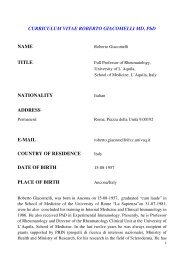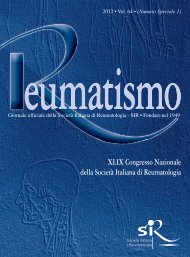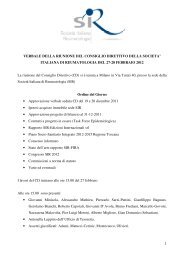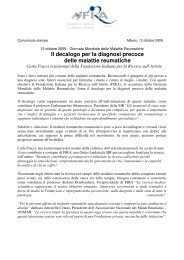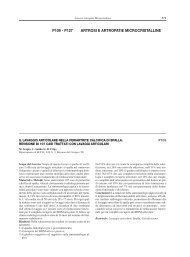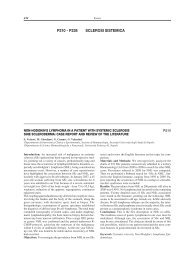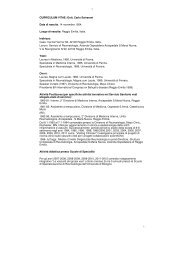M. Mosca (Pisa), R. Perricone (Roma) - Sir
M. Mosca (Pisa), R. Perricone (Roma) - Sir
M. Mosca (Pisa), R. Perricone (Roma) - Sir
Create successful ePaper yourself
Turn your PDF publications into a flip-book with our unique Google optimized e-Paper software.
AUTOINFLAMMATORY DISEASES<br />
M. GALEAZZI 1 , L. CANTARINI 1 , G. BRIZZI 1 , S. NICCOLINI 1 , O.M. LUCHERINI 2 ,<br />
C.T. BALDARI 2<br />
1<br />
Interdepartmental Research Center of Systemic Autoimmune and Autoinflammatory Diseases, Unit of Rheumatology,<br />
Policlinico Le Scotte, University of Siena, Siena, Italy;<br />
2<br />
Department of Evolutionary Biology, University of Siena, Siena, Italy<br />
Autoinflammatory diseases are a group of disorders<br />
characterized by spontaneous attacks of systemic<br />
inflammation as well as inflammation of specific<br />
tissues without autoimmune etiology or presence<br />
of pathogens.<br />
These diseases include both hereditary (Familial<br />
Mediteranean Fever, FMF; Mevalonate Kinase<br />
Deficency, MKD; TNF Receptor Associated periodic<br />
Syndrome, TRAPS; Cryopyrin associated Periodic<br />
Syndrome, CAPS; Blau Syndrome, Pyogenic<br />
sterile Arthritis, Pyoderma gangrenosum and<br />
Acne syndrome, PAPA; Chronic Recurrent Multifocal<br />
Osteomyelitis, CRMO) and multifactorial<br />
disorders (Crohn’s and Behcet’s diseases) (1).<br />
Among the hereditary periodic disorders, the Tumor<br />
necrosis factor (TNF)-α receptor-associated<br />
periodic syndrome (TRAPS) is a dominantly inherited<br />
disease caused by missense mutations in<br />
the TNFRSF1A gene which encodes for the TNFα<br />
receptor (2). TRAPS is characterized by attacks<br />
of fever, polyserositis, arthralgia, myalgia, skin<br />
rash, periorbital oedema and/or conjunctivitis; up<br />
to 25% of patients may develop systemic amyloidosis<br />
(3).<br />
Familial Mediterranean Fever (FMF) is the most<br />
common autoinflammatory disorder; it is autosomal<br />
recessive and is caused by mutations in the<br />
MEFV gene, which encodes the pyrin protein, and<br />
is characterized by recurrent attacks of fever with<br />
serositis, synovitis and skin involvement (4). Attacks<br />
of FMF last from 1 to 3 days and are typically<br />
characterized by colchicine responsiveness<br />
(5, 6).<br />
The diagnosis of FMF is based on clinical criteria,<br />
and the demonstration of MEFV mutations<br />
confirms the diagnosis in suspected patients (7).<br />
Concerning the group of multifactorial forms, an<br />
autoinflammatory etiology has recently been proposed<br />
also in more common skin diseases sharing<br />
candidate genes or clinical features with the classically<br />
previously described autoinflammatory diseases.<br />
In particular, some of the candidate genes<br />
implicated in the pathogenesis of psoriasis are<br />
shared with Crohn’s disease and pustular psoriasis<br />
is actually going to be considered as a chronic autoinflammatory<br />
disease not only for its clinical recurrent<br />
episodes but also for its typical pronounced<br />
infiltration of neutrophils, which is the “histopathological<br />
hallmark” in all the classically previously<br />
described autoinflammatory diseases. Recurrent<br />
episodes and neutrophilic cell infiltrates are also<br />
typical of the previously defined “neutrophilic cold<br />
urticaria”.<br />
Although a genetic mutation has not been associated<br />
to the “neutrophilic cold urticaria”, these features<br />
and the cold induced urticarial rash, also described<br />
in the classical Cryopyrin associated Periodic<br />
Syndromes, support the hypothesis that also<br />
the neutrophilic cold urticaria’s pathogenesis can<br />
be related to an altered cryopyrin. Furthermore,<br />
other disorders such as Behcet’s disease and adult<br />
Sill syndrome have been recently included in the<br />
group of autoinflammatory diseases.<br />
In our experience, over a period of 12 months we<br />
have analyzed 120 patients admitted in our Unit<br />
and presenting with clinical manifestations suggestive<br />
of autoinflammatory disorders. Fifty eight<br />
were females and 62 were males; out of them, 41<br />
one were pediatric patients (age


